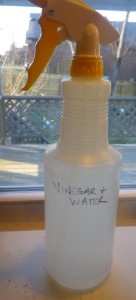Cleaning with Vinegar
 I recently saw a blogger comment that her cleaning lady used vinegar to clean her floors, but it made her house smell like a pickle factory.
I recently saw a blogger comment that her cleaning lady used vinegar to clean her floors, but it made her house smell like a pickle factory.
I use vinegar to clean my floors, surfaces, and windows, and I don’t have that problem. If you’re using vinegar and the smell remains after the surface dries, you’re using too much or doing something wrong.
To mop my floors, I use ¼ cup vinegar for 3 gallons of hot water. I also add about 10 drops of essential lemon oil.
To wash surfaces, I use about ¼ cup vinegar in a quart-sized spray bottle, then fill that with water.
To wash windows, I use equal parts vinegar and water and squeegie it off of the surface.
Vinegar is an amazing product. It’s made from fermented alcohol, and serves as powerful disinfectant and cleaner. According to Care2.com, a straight 5 percent solution of vinegar—the kind you can buy in the supermarket—kills 99 percent of bacteria, 82 percent of mold, and 80 percent of germs (viruses).
Hallee
I’m so grateful for your visit, today.
You would bless me if you added me to your ![]() feed reader or subscribed
feed reader or subscribed  via email.
via email.
You can also become a fan on ![]() Facebook or follow me on
Facebook or follow me on ![]() Twitter. I would love to see more of you!
Twitter. I would love to see more of you!


(but acetic acid is not the same as alcohol even if it is made by fermenting alcohol. they have different chemical properties)
Yes. Still simple ingredients.
You have a background in chemistry, right? If you do, I have a question.
I use vinegar to clean almost everything in my house. I always thought the vinegar smell goes away as it dries?? That’s been my experience anyway–and sometimes I use straight-up vinegar (in the shower, for instance).
My mom was asking, she has a vinegar/water mix to clean her freezer/fridge, would it work on wood cupboards?
Biology, not chemistry… so depending on the question I might be able to answer or I might be swamped. Someone else reading might also have an answer.
I LOVE to use vinegar to clean. Just like you said, frugal, effective and SAFE! What more can we ask for?
I was curious about what properties become neutralized with the mix of vinegar and baking soda. Would baking soda still be effective with odors? Would vinegar still soften water? Etc.
I’ll try to read up on this. I assume that vinegar’s water softening effect would be due to its acidity. (THis is why you can use it occasionally to get mineral deposits out of a coffee maker.) If you mix it with baking soda you will neutralize the pH (depending on the amount of baking soda you add) so it will not have that effect. You will also reduce its acidity by diluting it with enough water.
I tried to read up on using baking soda to neutralize odors. I was hoping to find better sources but all I found were google hits.
The ones I did find talked about baking soda neutralizing acidic odor substances (and some bases). Those neutralizing effects related to pH would not happen if baking soda were mixed with vinegar.
If you combine the right proportions of baking soda and vinegar, the hydrogen ions from the vinegar combine with the bicarbonate ions from the baking soda to make carbonic acid. The carbonic acid breaks down into water and carbon dioxide; the carbon dioxide leaves the solution as bubbles. What remains is a solution of sodium acetate at neutral pH, which as far as I know does not have any value for neutralizing odors.
Maybe in some cases there’s some benefit to using a frothy bubbly solution to help dislodge dirt by the bubbling action; I don’t know.
If you make a paste of baking soda with vinegar to use it for scrubbing, I’d think that you’d be using enough more baking soda than vinegar so that the baking soda would not all be dissolved. I’d expect that the vinegar would be neutralized and more baking soda from the paste would dissolve into the liquid so that the liquid making the paste would be alkaline even though you used vinegar to start with.
(In labs, people do use sodium acetate as a salt solution along with alcohol to precipitate DNA, but I don’t see this as relating to odor control.)